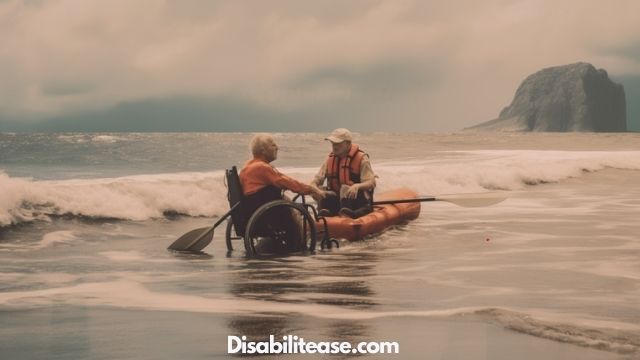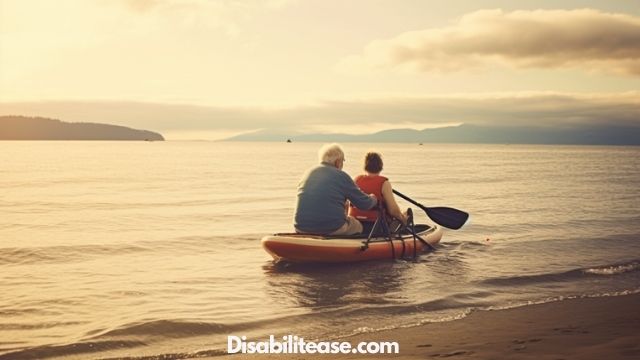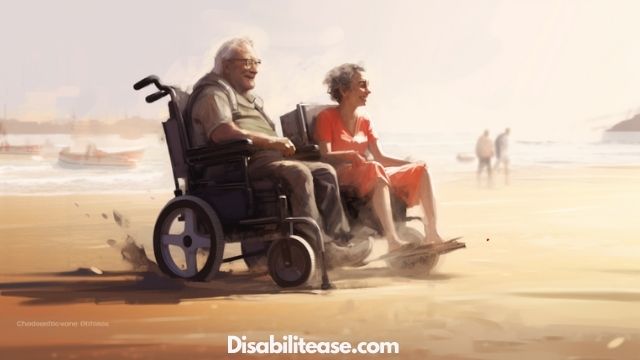Travel can be a great way to open up new opportunities for anyone, but it can be especially beneficial for disabled and elderly people.

Despite the challenges that may come with travel, many of these individuals experience greater freedom and independence when they explore new places.
With the right preparation, traveling can be an incredibly enriching experience, offering the chance to learn new skills and create memories that will last a lifetime.
So if you’re a disabled or elderly person considering taking a trip, read on to find out more about how travel could benefit you!
Table of Contents
Benefits of Travel for Disabled and Elderly People
You can gain valuable experience and knowledge from traveling, even if you’re disabled or elderly. Traveling gives disabled and elderly people the opportunity to connect with locals, learn about different cultures, and develop emotional growth. It allows them to step out of their comfort zone and expand their horizons in ways that they may not have been able to before.
Traveling provides a unique chance for those who are disabled or elderly to explore new places, discover hidden gems, try local cuisine, and meet new people. Ultimately, it helps them appreciate life more fully than before. Going on vacation also helps these individuals build strong relationships with others by connecting with locals in new environments. This connection helps create a sense of belonging, which can lead to emotional growth along with an increased level of self-confidence.
In addition, travel can be used as a form of therapy for those who are disabled or elderly. It offers an escape from the everyday routine and allows them to focus on themselves without feeling judged or alone. Through this type of exploration, they can improve their physical health while developing mental strength in an enjoyable way.
All these benefits add up to make travel a worthwhile endeavor for anyone, regardless of age or disability status.
Preparing for Travel

When travelling with a disability or as an elderly person, it’s important to be prepared. Accessible accommodation and travel insurance should be researched ahead of time to ensure your comfort and safety.
Additionally, finding accessible routes and locations can help make the experience smoother – so take the time to locate any helpful resources that can assist you during your travels.
Accessible Accommodation
Finding accessible accommodation for disabled and elderly travelers can be a challenge, but there are many solutions available to make the process easier.
Assessing needs and planning trips in advance is essential for ensuring that accommodations meet the requirements of travelers.
When researching potential places to stay, it’s important to consider accessibility features like wheelchair ramps, elevators, grab bars, and other amenities that might be necessary.
Another tip for finding suitable accommodations is to check online reviews from previous travelers. Many websites provide detailed information about accessibility features at hotels and resorts, as well as helpful feedback from customers who have stayed there before.
It may also be beneficial to seek out organizations or businesses that specialize in providing travel services for disabled individuals.
| Accessibility Features | Online Reviews | Travel Services |
|---|---|---|
| Wheelchair Ramps | Detailed Information | Organizations |
| Elevators | Feedback from Customers | Businesses |
| Grab Bars | Specializing in Providing Travel Services for Disabled Individuals |
Travel Insurance
It’s essential to make sure you have the right travel insurance for your trip. That way, you can confidently explore without worrying about unexpected surprises. Make sure your policy covers medical coverage and any specific travel restrictions that may be applicable to disabled or elderly travelers.
Here are some things to consider when choosing your travel insurance policy:
- Medical Coverage:
- Check if the insurance plan offers medical evacuation and repatriation for those with disabilities or chronic illnesses.
- See what medical treatments are covered during your travels.
- Travel Restrictions:
- Ensure there are no special conditions on traveling with pre-existing health conditions such as disabilities or age restrictions.
- Confirm whether any additional fees are required when traveling with particular disabilities or equipment.
By taking these steps, you can relax knowing that if something unexpected does happen, then you will have the support of a knowledgeable team who can help.
Finding Accessible Routes and Locations
Discovering accessible routes and locations can make your trip smoother and more enjoyable. Exploring options is key for disabled and elderly travelers, as it allows them to plan their journey ahead of time to ensure that all medical considerations can be met.
There are numerous tools available online, such as disability-friendly travel guides, which provide detailed information about the accessibility of different routes and locations. These resources also offer valuable advice on navigating public transportation systems, and identifying wheelchair-friendly restaurants, hotels and attractions.
Furthermore, many airlines now provide special assistance to travelers with disabilities or mobility impairments so they can enjoy a smooth trip without any worries. By researching ahead of time, disabled and elderly people can find the best accessible route for their travels and maximize their learning experiences along the way.
Learning New Skills While Travelling

Traveling is an amazing opportunity to enhance independence, explore new cultures and experiences, and develop resilience and adaptability. By traveling, you can gain a newfound sense of confidence in your own capabilities and go beyond the boundaries of everyday life.
You’ll also be exposed to different people, ideas, and customs that you wouldn’t otherwise have access to, which can open up your mindset and help you feel more connected with the world around you.
Finally, traveling teaches valuable skills such as problem-solving, flexibility, resourcefulness, and creativity that’ll serve you well for many years to come.
Enhancing Independence
You can unlock new possibilities for yourself by traveling, giving you an opportunity to enhance your independence. One way to do this is by developing social connections with people from different places and backgrounds. This can help expand your understanding of the world and open up new opportunities for personal growth.
Additionally, traveling gives you the chance to explore various cultures and learn about their customs and traditions, which can lead to emotional growth. By doing so, you’ll become more self-aware and confident in yourself, allowing you to take control of your own life.
Traveling can be a great way for disabled or elderly individuals to learn new skills that they might not otherwise have access to.
Exploring New Cultures and Experiences
Experience the world and open up a whole new realm of possibilities by immersing yourself in unfamiliar cultures. Travelling can help disabled and elderly people discover nature, interact with locals, and explore new experiences that they wouldn’t otherwise have access to.
Visiting different places can be the perfect opportunity to learn more about oneself and gain insights into other cultures, which can help expand one’s view of the world. By traveling, disabled and elderly people can also benefit from social activities like sightseeing or visiting monuments.
This kind of travel provides them with an excellent place to get away from their usual environment, allowing them to gain knowledge while broadening their horizons. Spending time in foreign lands allows for long-term memory formation as it’s an opportunity to take in information about all aspects of culture, including language, customs, food, architecture, music, etc., which can further enrich their lives.
Developing Resilience and Adaptability
By exploring unfamiliar cultures, you can hone your adaptability and resilience skills. Travelling can help disabled and elderly people build their self-esteem by relearning how to navigate new places and explore different customs.
Developing flexibility in situations is important to become easily adaptable to new environments, which can be especially valuable for those who may face mobility or physical limitations. Through travelling, they can learn the importance of being open-minded when faced with unexpected obstacles that come with visiting a new destination.
By taking the opportunity to travel, it gives them the chance to practice problem-solving in unique settings while developing confidence in their own abilities.
Conclusion
You can see that traveling can help disabled and elderly people learn new skills. It offers a chance to explore, discover, and gain confidence in themselves and their abilities.
Plus, it helps them stay healthy, active, and connected to the world around them. With a little preparation and planning, you can make travel an enjoyable and enriching experience for you or your loved ones.
So why not take a break from the daily routine and enjoy all the benefits that travel has to offer? Who knows what exciting experiences await?

Hi, my name is Eddie, I am a professional trainer specializing in the elderly population and I’m also a website designer. I love training in the gym, going to the beach, traveling, and having good food.
I combined my love for sport and website designing to make “DisabilitEase” whose purpose is to help elderly and disabled people live a more full and active life, have more fun, and enjoy their unique journey despite any disability.



